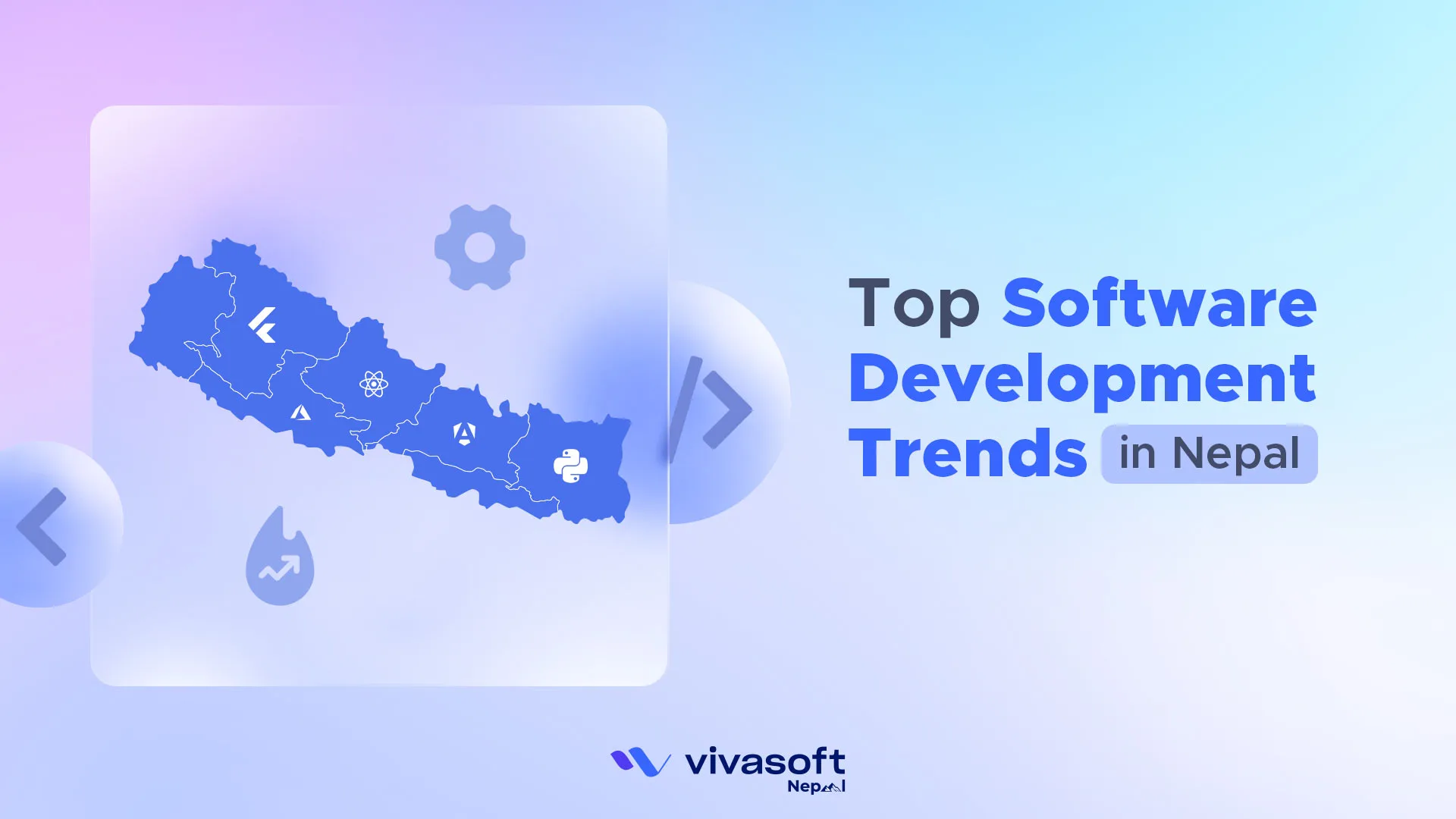The software industry in Nepal has grown from humble beginnings into a globally recognized market. Remarkably, Developers and companies now use new technology, helping many industries create better and faster solutions. For example, custom software solutions address local needs, while artificial intelligence boosts automation efficiency.
Cloud computing also helps companies grow without high costs. Meanwhile, blockchain makes transactions safer and clearer. Because of this, Nepal is becoming a popular place for software outsourcing and digital products.
This shows that the country’s IT sector is growing quickly and points to current software development trends in Nepal.
A Closer Look at Software Development Trends in Nepal
Technology never waits; it reshapes industries quietly yet profoundly. Nepal’s software development scene is no exception, blending global innovation with local insights to create unique development trends.
Custom Software and MVP Development
Custom software in Nepal fixes specific problems. For example, schools need dashboards in their local language, and shops want POS systems with VAT included. Because of this, many local businesses choose custom software over ready made solutions in Nepal, as these better align with their industry specific needs.
If you’re weighing your options, here’s a helpful look at the differences between off the shelf and custom software to guide your decision.
At the same time, startups grow faster by first building basic versions of their apps. Instead of making full apps, they focus on important features like login, dashboard, and payment to test their ideas.
AI and ML Driven Development
Software developers in Nepal build smarter apps for health, finance, and education by using AI tools like TensorFlow and Scikit-learn. A key trend is automating data entry – OCR reads Nepali documents, cutting hours of manual work in KYC.
Another growing use is chatbots that understand Bangla and Nepali, answering many questions without human help. To keep speed developers will train their models on the cloud using services like Google Collab or Amazon AWS which have GPU power.
Low-code/No-code Development
Nepal-based entrepreneurs and small teams have been building visual apps using platforms like Glide and Bubble. These resources work nicely with Airtable or Xano, allowing them to manipulate data, without the need to code a backend. And with Zapier, they can automate data between over 2,000 web apps.
Thus, they are able to launch internal dashboards, basic CRMs, or MVPs quicker, and in a cheaper approach. As such, startups can quickly test ideas and focus on growth in lieu of lengthy development cycles.
Blockchain Development
Blockchain is trending in Nepal as well, especially for digital identity, remittance, and decentralized record keeping. It serves various industries by developing systems that are secure and easily verifiable. Blockchain technology removes central control, making data tamper-proof and trustworthy.
As a result, the decentralized systems are so used in finance and supply chains to increase security and efficiency. To understand how it is applied broadly, here are some key components of blockchain:
- Web 3.0: The third era of the internet focusing on decentralization and user control.
- NFT: A digital asset representing ownership or proof of authenticity of a unique item, stored securely on a blockchain.
- DeFi: Decentralized finance platforms that provide financial intermediation without central authorities.
- Smart Contracts: Self-executing contracts that execute themselves automatically as soon as they meet the conditions.
- Gaming: Blockchain-based games enabling true ownership and trading of in-game assets.
Cybersecurity and DevSecOps
Software developers in Nepal adopt DevSecOps by integrating automated security tools within development pipelines. This catches vulnerabilities early and reduces expensive fixes. Although few experts follow OWASP standards, ensuring stronger code safety.
Additionally, combining these tools with agile development methods boosts delivery speed without losing quality. This practical approach increases client trust noticeably, helping Nepal’s software industry meet global security requirements more reliably and competitively.
Cloud-Native Development
Experts in Nepal adopt cloud-native development. They use containers and microservices that improve app scalability greatly. Also, they apply automated deployment tools to speed up release cycles efficiently.
There’s also the fact that cloud providers like AWS drive down infrastructure costs enough to make it possible for startups to survive.
Here, you will find a blend of flexibility and cost-saving, combined with agile practices. This enables software development companies in Nepal to deliver modern software that competes globally and meets growing user demands.
Digital Payment Platforms Development
To improve payment security developers in Nepal use multi-factor authentication, which protects user accounts well. By integrating lightweight features, they ensure smooth performance on various devices.
At the same time, biometric verification helps meet government regulations strictly. This combination of strong security and easy access helps to expand digital payments in modern software solutions. As a result, more people are able to use cashless options, driving steady growth in businesses.
Outsourcing Development
Outsourcing development, once seen as a budget fix, now shows real technical strength. Today, Nepal has become a hub for outsourcing software development, offering skilled teams and smooth collaboration on global projects. Developers follow Agile methods using Jira for clear task tracking, and CI/CD tools like GitLab and Docker keep releases stable.
Developers skilled in Laravel or Flutter, for instance, deliver scalable apps fast. Clients especially from Europe experience convenient collaboration, since timezone overlap and strong communication reduce delays without needing constant follow-ups.
Open Source software
Looking closer, Nepali developers actively join open-source projects on GitHub. This practice improves popular code libraries, saving time and effort in development. As a result, software quality increases while bugs decrease early in the process.
Additionally, they build reusable modules to speed up future projects. This reduces technical debt, making software easier to maintain and update.
Internet of Things
IoT links devices for fast, simple data sharing. Specifically, developers of Nepal use MQTT because it sends tiny messages quickly with low power use. Moreover, this extends device battery life significantly. IoT is picking up in Nepal, mainly in farming, smart homes, and city planning.
Startups are building tools for things like smart irrigation and air monitoring. Some government and private projects are testing smart city ideas. Most parts are still imported, which makes it costly. But local interest is growing, especially among students and developers.
What Are the Benefits of Software Development In Nepal?
Sometimes the greatest advantages come from unexpected places. Nepal offers more than cost savings. Instead, it brings quality and global expertise in every line of code written.
- Cost-Effectiveness: Nepal is a cheap country. This allows Software development firms in Nepal to offer competitive pricing models while giving you access to teams with proficiency in full-stack development, DevOps and testing.
- Quality and Innovation: They Use Modern Stacks Such As MERN, Flutter, Kubernetes & Follow CI / CD Pipelines and agile workflows. This showcases that they are not that far behind from the global standards.
- Smooth Communication: Easy and smooth collaboration within timezones due to their English language proficiency and experience with industry standard tools like slack, jira, github and more.
- Reliable Work Culture: A rising number of software development companies in Nepal follow a structure of sprint planning, regular code reviews, and client reporting, maintaining their quality in the project development process around deadline.
- Global Experience: Nepal-based firms have built numerous groundbreaking SaaS, fintech and e-commerce platforms for US, UK and Australian clients. This shows in their expertise in architecture planning and maintaining high code quality for clients around the world.
What Are the Software Development Challenges in Nepal?
Growth often walks hand in hand with obstacles. The software development sector in Nepal has been growing steadily, however there are some fundamental reasons that affect project schedules and standards of the deliverables.
- Talent Gap: You might encounter technical professionals with insufficient experience in the latest technologies like cloud computing and AI which may slow things down.
- Infrastructure Limitations: Daily coding and testing is affected by frequent power outages and poor internet, decreasing productivity.
- Budget and Funding Constraints: Startups cannot afford proper QA and security, leading to irresponsible risk.
- Rapid Technological Changes: It’s challenging for developers in Nepal to stay updated as new technologies and tools keep emerging so quickly.
- Regulatory and Compliance Issues: A large degree of regulation, with huge differences from one region to the next, delays the deployment of software, and requires more legal awareness.
What Should Businesses Consider Before Starting Software Development in Nepal?
Starting strong means looking beyond code. Success depends on clear goals, trusted partnerships, foresight into scalability, communication, and legal safeguards.
Business Goals and Scope
Clearly defining KPIs gives the development team a tangible benchmark. In Nepal, startups that align their software features with efficient operational goals early tend to avoid overbuilding unnecessary features. Thus, they save both time and budget in the long run.
Right Development Partner
Nepali firms with logistics or fintech experience reuse tested parts like secure logins and live dashboards. This reuse can speed up projects by about 30%, based on past data. But teams without this knowledge build from scratch, causing delays and higher costs. Experienced teams also spot problems early, reducing bugs after launch.
Understanding the Budget vs. Value Equation
Though cheap developers save money first, they often skip thorough testing and quality checks. In contrast, experienced teams use QA automation and agile methods to catch issues early. As a result, they deliver stable code that needs fewer fixes, reducing long-term maintenance time and costs significantly.
Team Communication and Project Management
Software development teams in Nepal use agile frameworks like Scrum combined with Jira to manage projects. These tools improve communication and track progress clearly. For example, daily stand-ups and regular reviews help teams stay focused and complete most tasks on time, proving structured processes increase productivity and product quality.
Scalability and Future-Proof Architecture
Businesses must choose developers who use microservices and API designs to build scalable software. Software development experts in Nepal apply container tools like Docker to separate parts, making updates easier and balancing loads better. This approach prevents system crashes and supports smooth feature growth, as seen in stable, growing software projects.
Legal, IP & Data Security
In Nepal, companies offering GDPR-compliant solutions and strong IP contracts often win global clients. For example, a development company using strict NDAs and data rules secured a long-term SaaS deal with a UK healthcare provider. This proves that legal care builds trust and opens international business opportunities.
Why Choose Vivasoft Nepal as Your Software Development Provider?
In the midst of Nepal’s fast-growing software scene, one trend clearly stands tall. Agile, offshore teams now work closely with global clients, adapting swiftly to changes. Today, businesses expect teams that are flexible, skilled, and deliver quality on schedule.
At this crossroads, Vivasoft Nepal takes the lead. Rather than simple outsourcing, the expert team of Vivasoft Nepal provides custom solutions designed to fit your unique business requirements. Whether you need JavaScript experts, Python developers, or full-stack engineers, Vivasoft Nepal offers Nepal’s top 1% talent.
What truly sets Vivasoft Nepal apart is our approach:
- To begin with, we use agile collaboration models, ensuring clear communication and timely delivery.
- Next, our MVP services help startups bring ideas to life faster and smarter.
- Moreover, we provide end-to-end development across diverse industries, including fintech, education, healthcare, e-commerce, logistics and more.
- Finally, the expertise of our software development teams covers a wide range of technologies like .NET, Golang, Flutter, cloud platforms and so on.
This combination means clients don’t just get developers; they gain dedicated tech partners who understand their vision. Over 50 global brands trust our company to turn concepts into scalable and successful software solutions, placing us among the leading software development firms in Nepal.
So, when you want to tap into Nepal’s rich tech talent, Vivasoft Nepal is your one-stop-solution for software development. We blend innovation and cost-efficiency aligning perfectly with the emerging software trends.
FAQs
Is outsourcing software development a good idea?
Outsourcing reduces costs by 40%, while providing access to world-class talent around-the-clock team with an agile methodology
Why is the software development industry growing?
Today, the demand is for smart tools that reach customers, process payments, digitize the supply chain and help a business stay competitive. Also, new technologies like AI and blockchain are creating more employment and business opportunities.
What technologies are driving innovation in Nepal’s software sector?
AI, blockchain, cloud computing and mobile applications are among the latest technologies that are being used by software development companies in Nepal to develop smarter tools, which are faster and serve both local and international customers.
How are local companies leveraging cloud services for innovation in Nepal?
Local companies in Nepal are leveraging cloud platforms like AWS, Microsoft Azure, and Google Cloud to reduce costs, enable remote work, securely store data, and rapidly develop applications for both local and global clientele.













